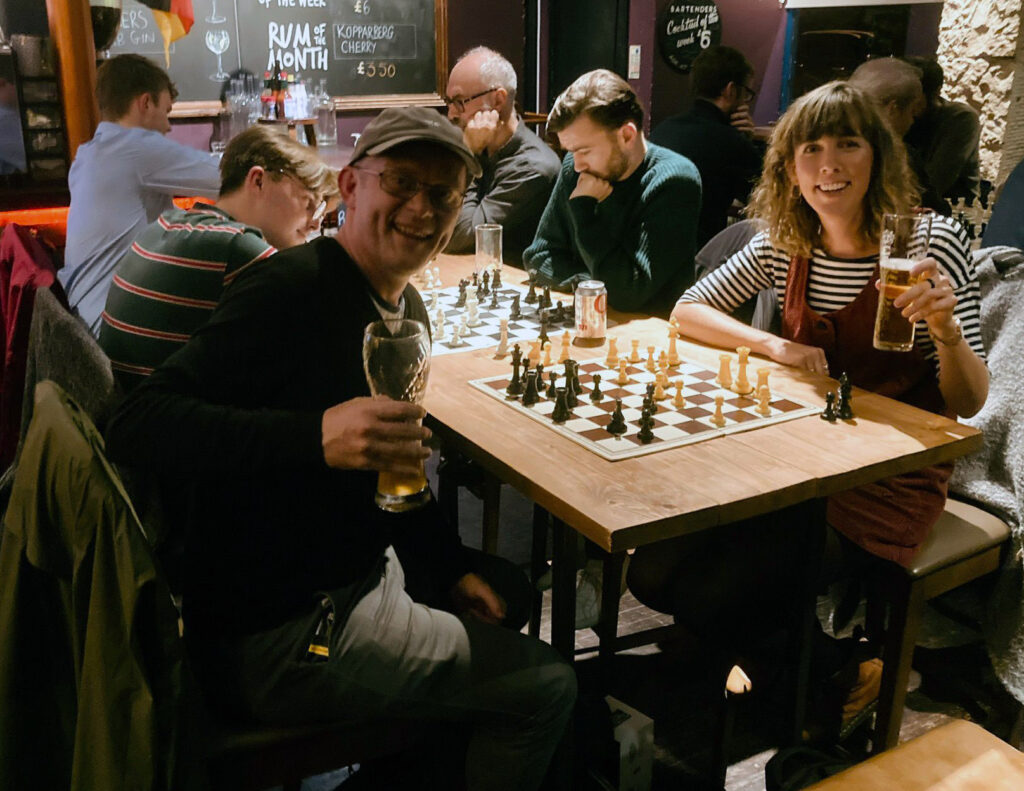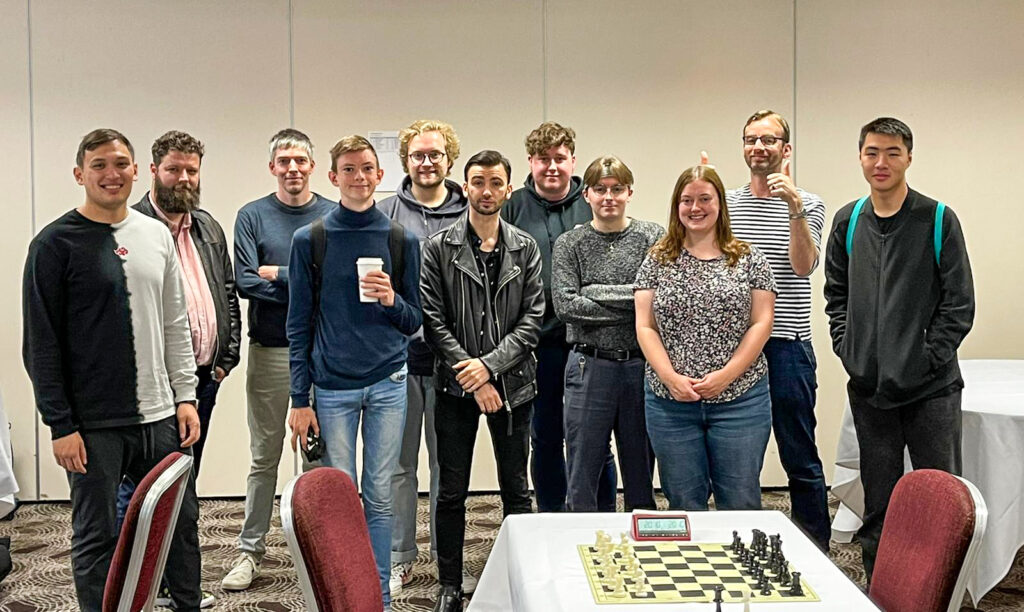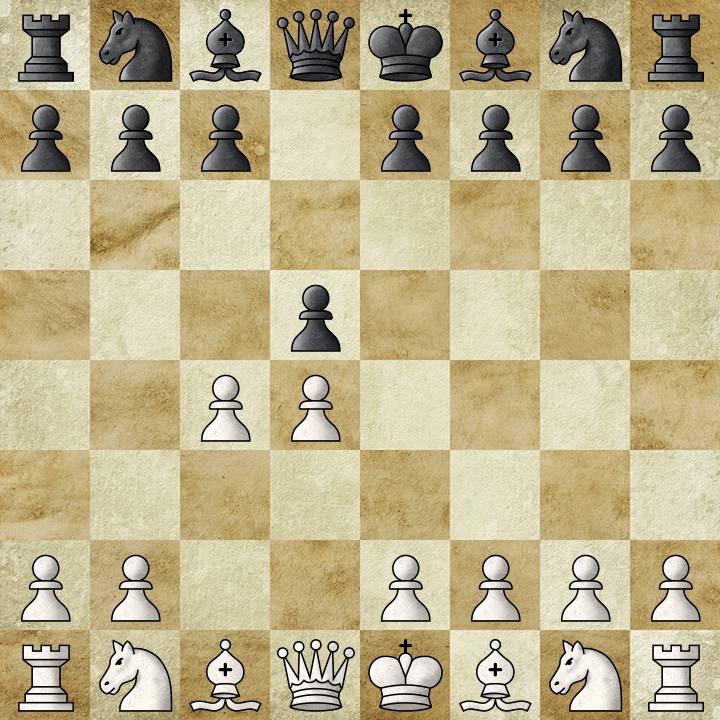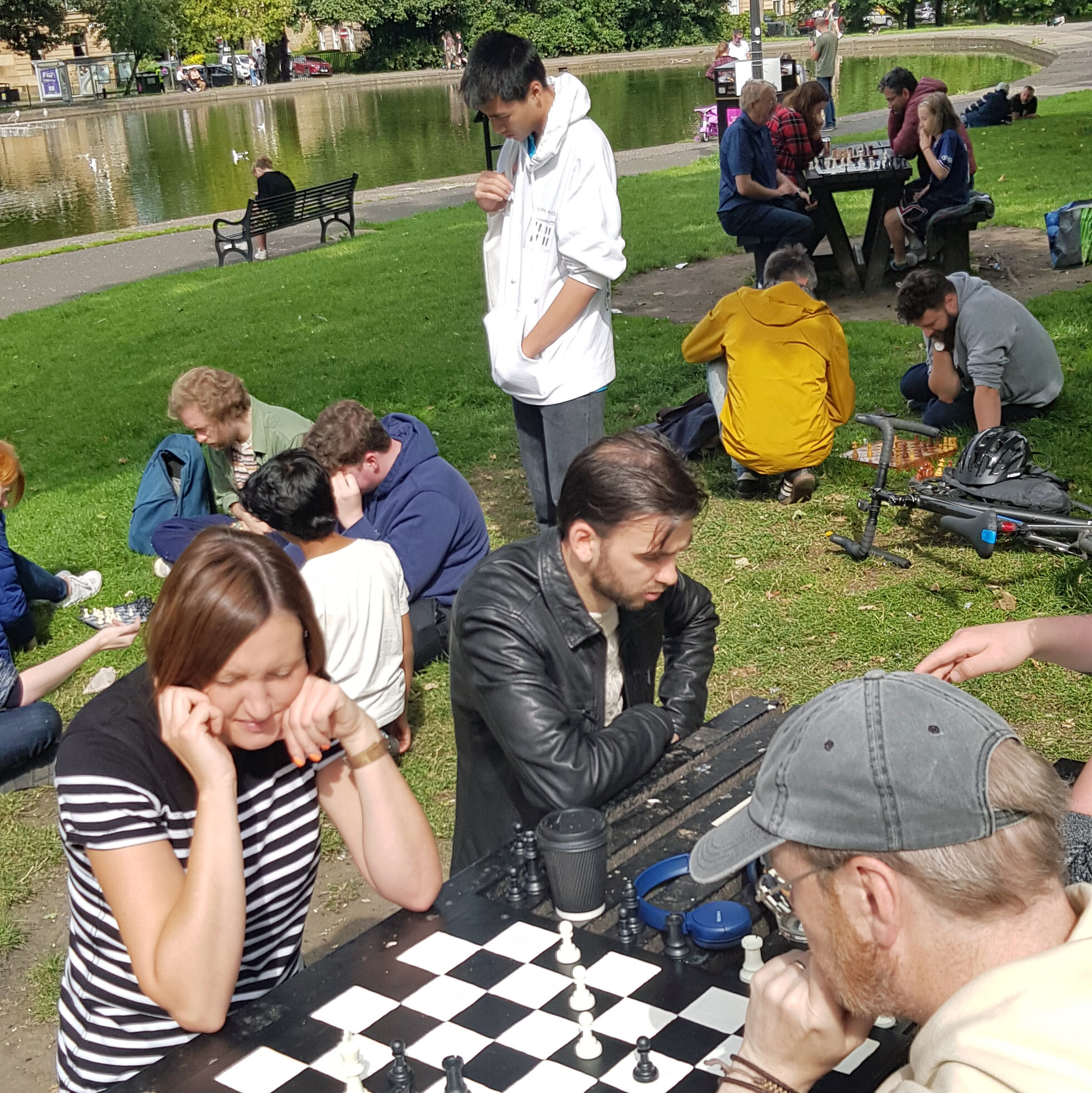Why do people join chess clubs?
What are they looking for?
What is it like to be part of Glasgow’s Queens Park Chess Club?
Each month, Derek Rankine (Club Secretary) interviews Queens Park members new and old and asks them to share their experiences and perspectives.
This month, Derek speaks to Ryan McGill, 29, a digital marketing executive from Maybole in South Ayrshire, who now lives in Shawlands, Glasgow.
Ryan joined Queens Park Chess Club at the start of the 2022/23 season. He is competing in the Beltrami Club Championship, and has represented the Club in Division 2 of the Dumbarton League, in inter-club friendlies, and in national Allegro tournaments (meeting Derek in one – and beating him!).
As of November 2022, Ryan has a rapid rating of 1609 on Lichess and is working towards a Chess Scotland grading.
Derek: Hi Ryan! Who introduced you to chess?
Hi Derek, thanks for inviting me. I’m not sure I can really credit anyone to getting me into chess other than myself. I think a lot to do with it was sheer curiosity. Chess is so ubiquitous, you can’t avoid it.
If I were to think of any reason as to why I gravitated towards chess, I’d say that I’ve always had a love for games of all sorts: board games, video games, card games. No matter the type of game, it’s a lot of fun learning how they work, how to get good at them, what strategies work, and why they work. When a game is known as ‘The Game of Kings’ and ‘The Ultimate Game of Strategy’ it’s hard not to be interested.
When any game is played at a high enough level you always hear, “it’s like a game of chess” – and I wanted to see how true that was by learning the game. If I were to credit anyone in teaching me, it would be IM John Bartholomew’s YouTube channel. His videos really helped me to understand ideas beyond how the pieces move, like basic opening principles and tactics.
I understand you didn’t play much chess growing up?
No, not at all. I started playing in 2017 at the age of 23. I have a friend who tried to get me to play chess when we were younger, but I wasn’t interested. I saw him again earlier this year and we had a few games, which I won. I think younger me would be happy with that.
Did Netflix’s The Queen’s Gambit and the online chess boom during the pandemic play a role in maintaining your interest in chess?
Yeah, definitely. My Lichess account has a huge period of inactivity from early 2019 until early 2021, a short time after The Queen’s Gambit came out. I knew I was going to love the show from the first trailer I watched, but I don’t think I could have predicted just how good it would be. I think it’s one of my favourite shows ever.
I’ve told so many people to watch it, and so many times I heard back: “I really loved it, even though I don’t have a clue about chess”. It was really great watching this big surge of interest in chess, and I didn’t want it to pass me by having stopped playing for a while. Now I think about it, I realise I’ve only been playing actively for three years.
You joined the Thursday Chess Group last year. How did you hear about the Group – and why did you decide to go along?
I joined in December of 2021, so I’m one of the longest tenured attendees. It’s been great watching it grow and transform.
Towards the end of lockdown, I felt like my life was so confined to my flat. I was working from home, and a lot of things were not back to running as normal. I was really excited to go out and do something on a weekday locally.
I saw the Thursday Group advertised in a Facebook community for my local Glasgow neighbourhood. I sent a screenshot to my girlfriend saying: “Do you think I should go?” She said, “Go for it”, and I’ve been there almost every week since.
You play with the Thursday Chess Group most weeks. For those who haven’t been, what is a typical evening there like?
One of the best things about the Thursday Group is that so many different people come. There are different people to play and catch up with every week. You get vastly different games – and vastly different conversation topics.

You can play anything from serious, timed games, to fun, casual games with loads of chatting. We’ve played four-player variants like Hand & Brain and alternating turns. You can spectate games. You can analyse positions with a group. You can learn opening and endgame theory from stronger players. There’s so much to do.
I’ve had weeks where I visited for an hour, and weeks where I stayed until we were asked to leave when the bar closed at 11pm. I’d really encourage people to try it out if they want a taster of over-the-board (OTB) chess. It has just moved from Brodies Bar to a bigger space in a new venue – the Corona Bar in Shawlands. Anyone interested can drop in anytime from 6pm until closing on a Thursday night and there is also a WhatsApp group they can join.
Why did you decide to join Queens Park Chess Club?
It just made sense to me. I was playing with a lot of the members on Thursdays and Sundays in the park, and having really good quality competitive games. I was surprised, after only playing online and in the bar, that I was getting some wins against Club players. I had expected the Club players to be at a level above.
It made sense for joining the Club to be the next step in my chess journey. To officially join a Chess Club, and compete in tournament games and league matches, seemed like an exciting place to go next. So I happily went to their first Tuesday night meeting this season, in Wellcroft Bowling Club at the end of August.
Did you have any preconceived ideas of what a Chess Club is like? How did the reality of Queens Park match your expectations?
I didn’t really have any clue what a typical Chess Club was like, having never been to one. I guess there’s a stereotype of Chess Clubs and serious players, but I didn’t really expect anything negative. Especially after a bunch of the Queens Park players started coming to the Thursday Group, and invited me to the Sunday sessions.
I had a great time on my first visit. I was expecting it to be really quiet while games were played, but it’s not like that at all. It’s not wholly different from playing in the bar. There’s plenty of chatting and laughs to be had, despite being more of a serious environment.
On Thursdays, you can play anything from serious, timed games, to fun, casual games. You can play team games, spectate, analyse, learn theory. There’s so much to do.
Ryan McGill
In your initial months, what have stood out as memorable experiences in Queens Park Chess Club?
Taking part in my first tournament, the East Kilbride Allegro, has probably been the highlight so far. I went 2/5 with one win and two draws, which I was very pleased with. My first win was the first game of the day, which felt really good and took a lot of pressure off.
I was fortunate to have the first game be against you, Derek, again because I felt a lot more comfortable playing against someone I knew. My aim was always just to get at least one win OTB, so I was really pleased to get that out of the way early. The time control, 20+10, seemed a lot more palatable than jumping straight into an hours-long classical game for my first real competitive experience. It wasn’t such a big jump from mostly casual games with no clock, or 5+0 or 10+0 games online. So I’d recommend an Allegro to anyone looking to start playing OTB at a competitive level.
I also fortunately won my first classical game in our friendly against a combined team from Strathclyde & Glasgow University. This felt like a totally different experience to the quicker time controls. I enjoyed it so much that I put myself forward for the league match against Bearsden B in Dumbarton Division 2. That match was another highlight. While I unfortunately lost, I was happy with my position during the majority of the game, and I played a lot of good, hard to find moves.
Yeah, I knew you would bring up our game! It was a brilliant win – you outplayed me positionally. Do you actively train and develop your chess?
Thank you, Derek! Yes, I do tactical puzzles most days, both a mix of rated puzzles on Lichess in order to progress to harder to grasp ideas and positions, and easier unrated puzzles on my phone, which helps with pattern recognition and trying to find simpler tactical combinations more quickly.
I also use the Lichess study feature and opening explorer every so often when I’m trying to learn ideas about specific openings and expand my knowledge of the middle game. I’ll also play a lot of unrated blitz, so I don’t have to worry about any rating points, but I still get the experience of pattern recognition and finding tactics without any pressure if the game doesn’t go well.
As mentioned earlier, I’m playing most Tuesdays, Thursdays and Sundays, so I’m getting my fix OTB too. I also watch some chess YouTubers so I’m taking in a lot through osmosis that way – although that’s mostly for entertainment purposes.

You play online and over-the-board, casually and competitively, and at various time controls. Do you have a preferred format?
I used to swear by 5+0 online, a maximum of 10 minutes for a game, but since starting to play OTB I much prefer playing in person. I’d really encourage online players to try some casual OTB if they can. I find it to be a much better environment for actually improving at chess with less stakes. You don’t have a rating to worry about, and people are really nice, helping you improve and not letting you make massive blunders, because then the game isn’t fun for either of you. I’d say my preferred format right now is OTB, either 10+0, or untimed.
What advice would you give to those just starting out on their chess journey, who are looking to develop their skills?
Remember to have fun. Chess is a game, and games are for fun. You’re going to lose a lot, but losing is the quickest way to learn, so don’t be discouraged.
After that, learn to develop your pieces quickly and actively, and focus on tactics. Putting the majority of your time into finding tactics like pins, forks and skewers is the quickest way to improve at a beginner level, in my experience. If you can, get to some OTB events, and join a local club or group. This will make chess a much more social experience, one I’ve found a lot more enjoyable than playing anonymous people online.
Do you have a favourite chess player, current or historic?
I don’t really know who my favourite player is. I always love seeing Magnus Carlsen play, because he’s arguably the strongest player ever. I love the romantic era of chess, with beautiful sacrifices and checkmate patterns, I could never play like that so it’s always great to watch games from players like Paul Morphy.
I also think Garry Kasparov is my pick for the greatest ever, he was the strongest player for the longest period of time, when chess was going through its most dramatic shift with the rise of engines. If I had to pick one player to be my favourite, I think it would Kasparov.
My chess ambitions? First and foremost, to keep having fun. I wouldn’t want it to turn into a chore.
Ryan McGill
What’s your preferred chess opening with White?
I play the Queen’s Gambit when I can. I’ve had a few openings as white through the years – the Ruy Lopez, the London System, the Scotch. I like openings that allow for quick development. I picked up the Scotch purely because I’m Scottish – which isn’t a great reason to play an opening, if we’re honest!

What attracted you to Queen’s pawn openings?
When I was first starting out, 1.d4 seemed offbeat and unexpected, even though it’s a close second to the more popular 1.e4. I liked the idea that I might be taking the Black player a little out of their comfort zone, and not have to deal with the mountains of 1.e4 variations.
After 1.d4, Black usually has the choice of which variation to go into from there, but if I don’t get a Queen’s Gambit, I’m pretty comfortable with all responses at this point. This just comes with experience.
Going to the Chess Club on Tuesdays, the Thursday Group and the Sunday morning sessions, plus online play and training, is a significant time investment each week. Do you have any issues balancing chess alongside family, work and social commitments?
I thought it would be more of an issue than it has been. I don’t really get up to much during the week after work, so I usually make it along to the local meetups. I like the flexibility it has given my schedule, even though it’s more of a commitment, playing so often.
There are so many options that even if I’m busy one day, I’ll usually be able to attend the next session. When I was just playing on Thursdays, missing out one week, meant I was waiting almost two weeks between OTB games. Now if I miss a Tuesday, I’ll probably be able to make it on Thursday and then on Sunday. It’s really great having so many options to play in a small area of south Glasgow.

It’s a busy local scene – as recent media items have highlighted. Do you have any long-term chess aspirations?
First and foremost, is to keep having fun. I wouldn’t want to get to a point where it turns into a chore or anything like that. I’d also like to get a Chess Scotland grade and an international FIDE Rating.
When I was playing online exclusively for a few years, an official FIDE rating seemed so alien to me, the kind of thing only professionals should have. That of course isn’t the case, and I’m well on my way to getting a Scottish grading. My next goal will be to use it as a baseline and push up to the next milestone.
I think small, personal goals are the key to improvement and enjoyment for me. I went 2/5 at my last tournament, next time I want 2.5/5 and then 3/5. I lost my first classical league match, and it’s an aspiration to get my first win this season. And most importantly is getting more consistent.
I have played some really good games, but I lack consistency and some of my games are not great to say the least. I think consistency is the basis for improvement. So once I get more consistent, then I can focus on improving.
Thanks Ryan, and good luck for the rest of the season. I’ll look forward to interviewing another Club Member next month. Meantime, readers can check out what Alex Radevic and Rhys McCrosson had to say.

